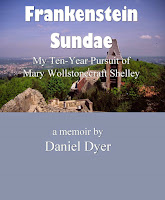All
That Other Writing
I’ll confess
that I was astonished to learn, early in my Mary Shelley research (the late 1990s), that she had
written so many other books besides Frankenstein—books
I’d never heard of, books I subsequently
read and, more or less, admired. I admired them not just for her knowledge and
literary craft but because I knew what she had gone through to produce them.
Some she wrote and/or began while husband Bysshe was still alive; others,
afterwards. In the ensuing pages, we’ll take a brief look at each—and at my
experience with it.
What surprised
me, too, was her range. Mary wrote travel books, futuristic books, romances,
historical fiction. And—as we’ll see—she wrote for periodicals and, in an
amazing stint of research and writing, a number of mini-biographies for an
encyclopedia. She would not stop writing, really, until the illness that would
claim her in 1851 began to assert itself most severely. And—not surprisingly—she
slowed when she and her son at last gained a bit of financial security when Sir
Timothy Shelley passed away on April 24, 1844 (born in September 1753, he’d
lived a lot longer than the norm, a lot longer than Mary, I am pretty sure,
hoped in her heart—ninety years
old!).
Mary does
not mention the death of Sir Timothy in what survives of her journal (by the
1840s she was not writing much in it); she does talk about it a bit in her published
letters. On April 25, 1844, a day after the death, she wrote about it to Claire
Clairmont.[1] Poor Sir Tim is gone at last—He died
Yesterday Morning at 6 o’clock. He went gradually out & died at last
without a sigh.[2]
I like that at last part. As we’ve seen, he had been
less than generous with his son’s widow, refusing even to meet her, a refusal
that continued for more than twenty years—dating
from her return to England in 1823 after Bysshe’s drowning in 1822. Sir Timothy
had grudgingly provided a maintenance allowance (not much) for Mary’s son,
Percy, who would be the legitimate Shelley heir. But it was Mary’s writing that provided the income to
support her and her son, who, upon the death of Sir Timothy, became Sir Percy
Florence Shelley.
Mary, in
subsequent letters, wrote some of her bitterness about Sir Timothy’s attitudes
and behavior. In a letter to Rose Stewart (a fellow writer of whom little is
known), Mary wrote on May 1, 1844: All
that he could he left away from him to his wife & second son. But I do not
blame Sir Timothy as much as others for the great injustice he has done his
grandson.[3]
Mary and Sir
Percy would live comfortably for the rest of their lives—but only with very grudging support of the estate.
[1] Claire, as you may recall, was the daughter of the
woman who had married Mary’s father after his wife Mary Wollstonecraft Godwin
had died shortly after the birth of little Mary. Claire had also run away with
Mary and Bysshe—that shocking 1814 elopement—and been in and out of Mary’s life
ever since. (Mary, at most times, preferred the out.) Claire, recall, had also had an affair—and a child—with Lord
Byron.
[2] Letters, vol. 3, 125. Unusual capitalization is in the original.
[3] Ibid., 131.


No comments:
Post a Comment